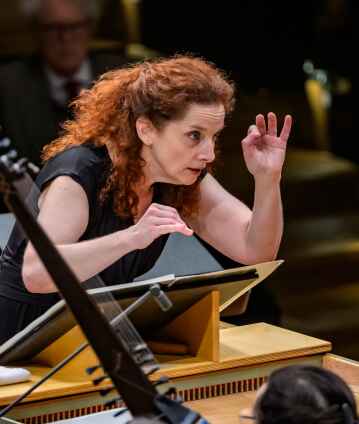Emmanuelle Haïm conducts French Baroque music

“Nothing that touched the heart”, complained one critic after the premiere of Jean-Philippe Rameau’s opera Hippolyte et Aricie. Rameau’s expressive, harmonically daring music irritated the audience, who were used to the simpler style of Jean-Baptiste Lully. Rameau or Lully? A question that caused a veritable culture clash. Today, both are regarded as the key composers of the French Baroque. Emmanuelle Haïm, an expert in Early music, sheds light on this fascinating controversy – an evening full of elegance and dramatic intensity.
Jean-Baptiste Lully was born Giovanni Battista Lulli in Florence. A French envoy discovered his musical talent and introduced him to the court, and at the age of 21, the son of a miller was appointed Sur-intendant de la musique du Roy by Louis XIV. This gave Lully a position of power in French music comparable to that of the Sun King: what he composed was law throughout the country. The artist was to reign over French concert life for a good decade, while new stage works by him were continuously performed at the court theatre.
Lully created an idiom of French Baroque music that was characterised by dance-like ceremonial elegance and tonal sophistication. Dancing in the magnificent halls of Versailles was a central element of Louis XIV’s demonstration of power. After a scandal involving a Turkish envoy at court, the king commissioned the star duo of the time, Lully and Molière, to write a satirical ballet comedy to mock the guest. The result was Le Bourgeois gentilhomme. The premiere took place in October 1670, with Molière and Lully themselves in the elaborately costumed title roles. Emmanuelle Haïm presents a suite she arranged herself, performed here by the Berliner Philharmoniker.
The conductor then turns her attention to excerpts from Jean-Philippe Rameau’s operas Hippolyte et Aricie, Castor et Pollux, and Dardanus, which were composed between 1733 and 1739. After Lully’s sudden death in 1687, the tragédie lyrique he had established was also declared dead. Rameau led French opera to a new heyday: he did not change the five-act form, but broke new ground by surprising audiences with sophisticated harmonic twists and giving the choruses complex middle voices. “Rameau’s visionary orchestration”, says Haïm, “announces what is going to be the great school of French writing for the orchestra.”
© 2025 Berlin Phil Media GmbH
Related interviews